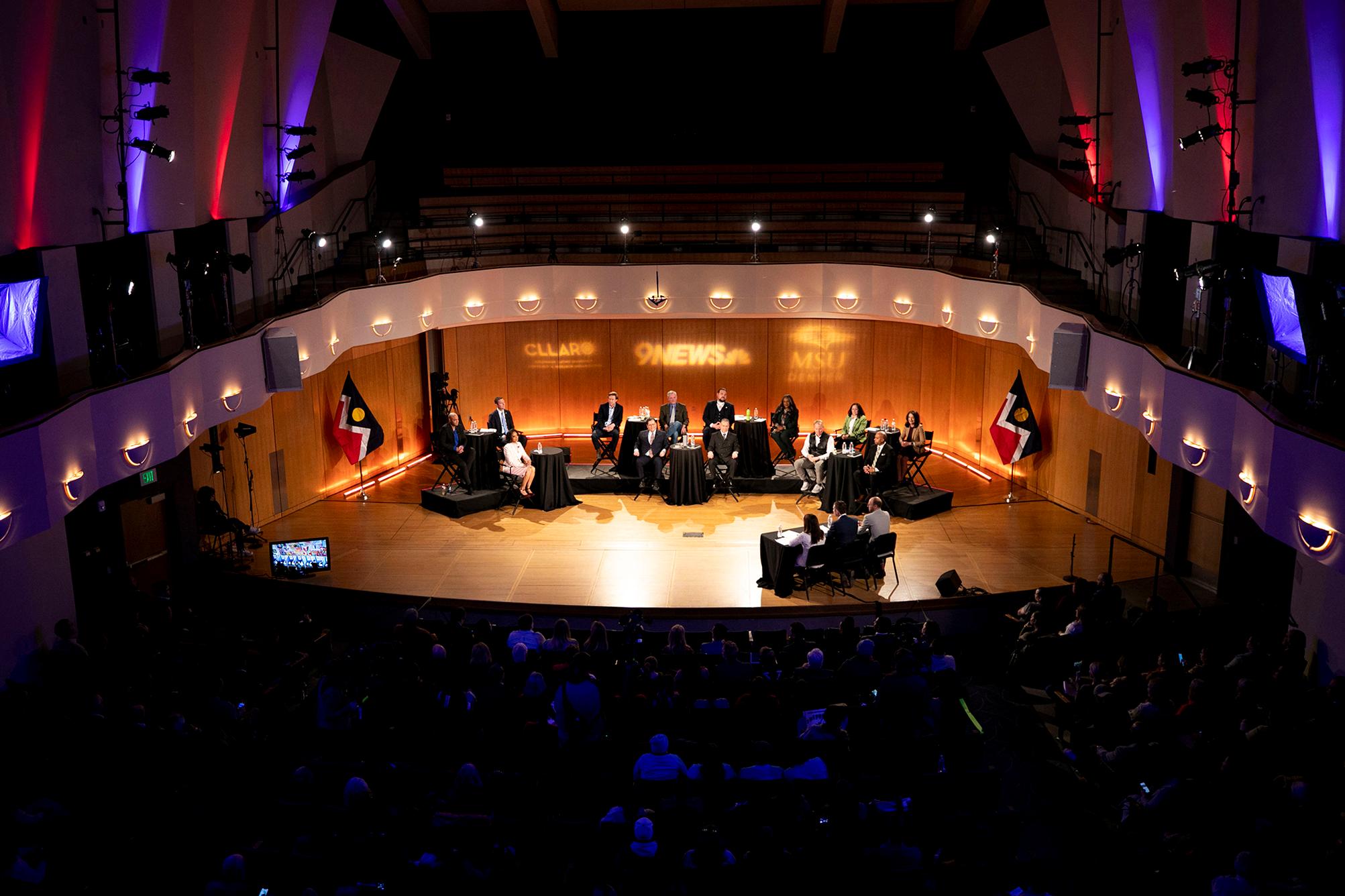Thirteen Denver mayoral candidates hashed it out Thursday night, during a must-watch 9News debate at Metropolitan State University -- the first of three hosted by the channel.
Candidates fought. They got personal. They staked their claims on issues, repaired mistakes made in the last debate, made a few more, and showed clearly how much most agree on what the city's issues are and how little they agree on policy.
On stage: Kwame Spearman, Chris Hansen, Lisa Calderón, Mike Johnston, Trinidad Rodriguez, James Walsh, Ean Thomas Tafoya, Aurelio Martinez, Leslie Herod, Thomas Wolf, Debbie Ortega, Kelly Brough and Terrance Roberts.
Voters witnessed a more substantive conversation with actual disagreements and even some more nuance than they did at the Regis CBS debate that included 16 of the 17 candidates on the ballot.
The 9News moderators Kyle Clark, Marshall Zelinger and Anusha Roy asked tough questions, kept the conversation moving and allowed candidates to have robust discussion without letting it get out of hand.
Yet there was some drama.
Hansen took brutal hits for the first TV ad of the campaign.
The ad showed a string of crimes and encampments, involving many people of color. Hansen presented himself in the ad as the good guy who would come in and alleviate Denver's crime problems.
The spot involved a Band-Aid, a Ring camera, a fuzzy attack on City Hall and more. It's a little confusing what Hansen was actually trying to say other than he'd be tough on crime and encampments. Whatever he was getting at, the video drew harsh criticism on social media and from fellow candidates.
Tafoya, a longtime environmental and community activist, asked his peers to raise their hands if they were disgusted by an ad that focuses on people of color committing crimes and experiencing homelessness.
Multiple candidates from across political perspectives, including Spearman, Calderón, Johnston, Rodriguez, Walsh, Herod, Wolf, Ortega, Brough and Roberts, raised their hands.
"I cannot believe that he would make this ad. I am so disappointed in you," Tafoya said. "We worked on things together."
Tafoya asked Hansen to "denounce it and take it away."
"I think that's fine," Hansen replied. "I took actual footage from around town. It is not just people of color featured in this ad. I think it's really kind of shocking this suddenly becomes this conversation about the way that we took footage."
Hansen said the ad was about the issues people care about -- not race.
"Public safety is the number one issue on voters' minds," he added. "I would address public safety. I would address the homelessness crisis. To have some accusation of this being some sort of racist ad, that doesn't make sense."
The claim was "totally overwrought," he said, to which other candidates swooped in.
"As a woman of color, as a Black woman, it's really interesting to me to have someone on this stage ignore the fact that people of color on this stage are asking you to take that ad down," said Herod.
"It is offensive, and it's scary for our communities," she said. "But I want to be clear. You didn't see what we saw because you're not us. But you've got to put those blinders away. You've got to have more people looking at your ads and in your administration that look like the communities you're serving.
"It was offensive Chris," she continued. She added that as his friend, she was disappointed, too.
Spearman added his take.
"There are more white people who are homeless on the streets of Denver right now than there are people of color," Spearman said. "And so, Chris, you know I love you, but I couldn't agree more with [Tafoya]. If you want to use your engineering degree, you've got to have statistics. And statistics are showing something that was not represented on that video."

But Spearman also had some issues with stats.
He made the case that there are two types of homeless people, those the system failed and those who are "exploiting the system."
His proof? A study from the homeless advocacy group Denver Homeless Out Loud. He incorrectly claimed that the study said that 52% of unhoused people would prefer to live in a tent than other forms of shelter.
Spearman had misread a graph in the study that even one of its authors, Terese Howard, a former member of Denver Homeless Out Loud and a member of Housekeys Action Network, acknowledged could be confusing. The graph appeared to be referring to percentages when it was actually referring to the number of people surveyed.
"In this survey, 91 out of 150 -- or 60.6% -- of respondents choose a house as their first choice," Howard explained. "52 out of 150 -- or 34.6% -- of respondents choose tent as their second choice -- meaning house as first but tent as above shelters."
Howard also clarified that the vast majority of unhoused people would prefer a home.
"In all other surveys we have done (including the one with 828 houseless people we are about to release) more like 95% of people want housing most," Howard wrote.
Calderón, a criminal justice advocate and nonprofit leader, blasted her fellow candidates for their homelessness policy, after being questioned by Clark about saying encampment sweeps were "mean-spirited."
She said her administration would use "evidence-based practices" to address homelessness. She said she was the only candidate to develop her approach to homelessness with unhoused people. And she contrasted her opponents' backgrounds with her own expertise as a criminal justice professor and the head of nonprofits that have worked in criminal justice, domestic violence and homelessness.
"With all due respect, these folks don't know what they're talking about," she said. "If Kwame was a student of mine, he would get an F for his analysis of that report."
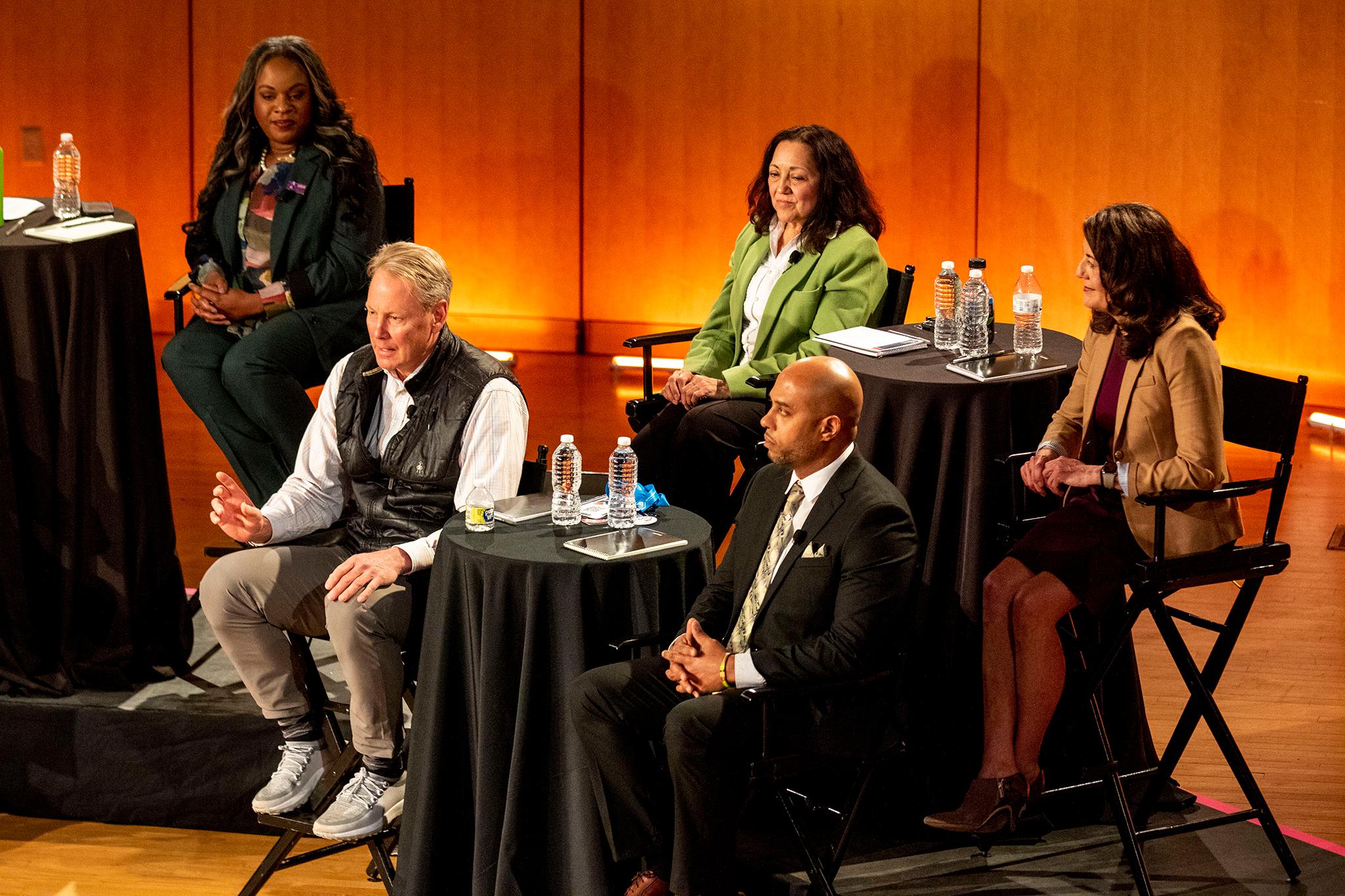
Ortega suffered her first real jabs during this election from Tafoya -- whom she oddly included in photos in her campaign materials early in the race -- and the hosts.
Ortega, who has served nearly 28 years on City Council, took pointed questions about what she's actually done in the role on the big issues facing the city.
While other candidates have announced significant proposals throughout the election, Ortega has published hers quietly on her website. Doing so, she's avoided some of the criticism other candidates have received and appears to be relying on polling that indicates her widespread name recognition will propel her to the run-off.
But when it came to addressing questions about what she's actually done, as a City Councilmember, to hold Suncor Refinery accountable for pollution, she pointed to her history advocating for the cleanup of the Asarco smelting plant in Globeville and more general work with the community.
Tafoya argued she has not been at the table in discussions about resolving corporate pollution with state or federal regulators. He argued she needed to take a more regional approach to environmental issues and stop mitigating harm.
"You've chosen to broker this middle deal when the communities that want justice want justice," he said.
She argued her mitigation efforts included securing money for housing.
Ortega often deflected accusations that she and Council were responsible for the city's ills by blaming the mayor. And she's correct that in a strong mayor city like Denver, Council has less power.

Roberts has set the agenda during this election for a conversation about social housing and social banking.
In a city where capitalist solutions to the housing crisis have been en vogue for years, Roberts has vocally pushed for an alternative: social housing funded by a public bank, making the message a signature of the campaign.
Calderón has also been a vocal supporter of building more social housing, funded by the city, on public land.
Together they have forced a conversation, and during the debate, Herod expressed her support for the idea.
When asked whether they supported some sort of social housing -- municipally developed homes or shelters -- all candidates on the stage raised their hands, with the exception of Thomas Wolf.
His take: Social housing is "horribly flawed." The free market can create housing faster and cheaper, he argued.
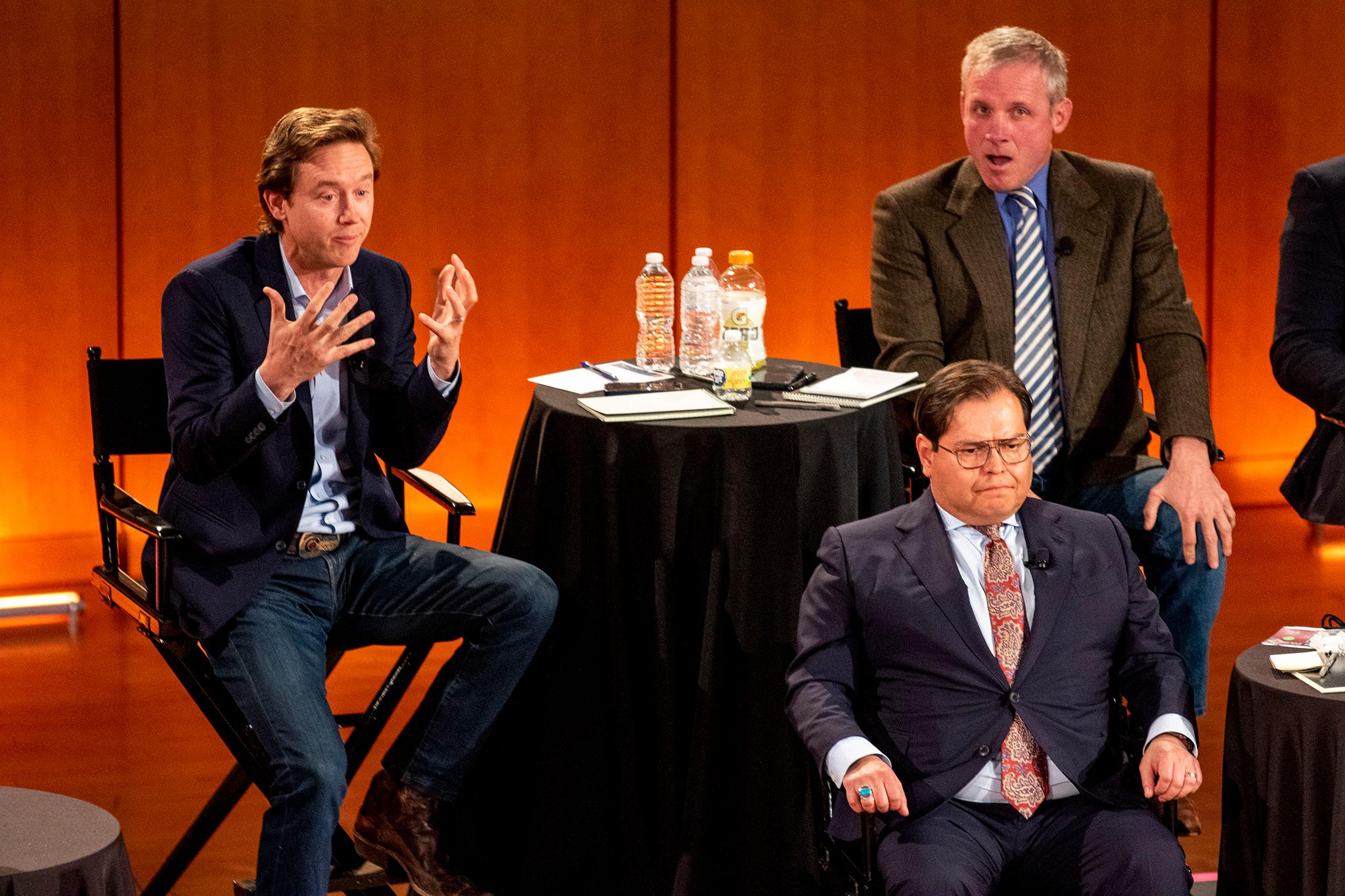
Johnston pointed out a recently passed statewide affordable housing ballot measure, Proposition 123, would allow public entities to invest in affordable housing developments -- something that long before happened during the Hancock administration.
Johnston was one of the proposition's architects and spent two years working on it. Voters approved the measure in November.
"It allows you to take out the profit motives, so instead of dollars going to out-of-state investors at 20% returns, you allow CHAFA (the Colorado Housing and Finance Authority) to invest in these," Johnston said.
This will bring $50 million a year to Denver to create social housing, he said.
Trinidad Rodriguez reemphasized how he supported involuntarily committing people who are a danger to themselves or others and elaborated on why.
The city is not doing enough to provide mental and physical health care and addiction treatment to residents, he argued.
"It's often the case that these conditions prevent people from actually accepting treatment and help," he said. "And so we need a solution that actually starts to serve this group of people.
"We need the ability to take people into treatment on an involuntary basis," he said. "I'm excited to see that the mayor has actually started talking about doing just this."
The current administration has been in talks with attorneys about the possibility, Hancock told CBS news earlier this year.
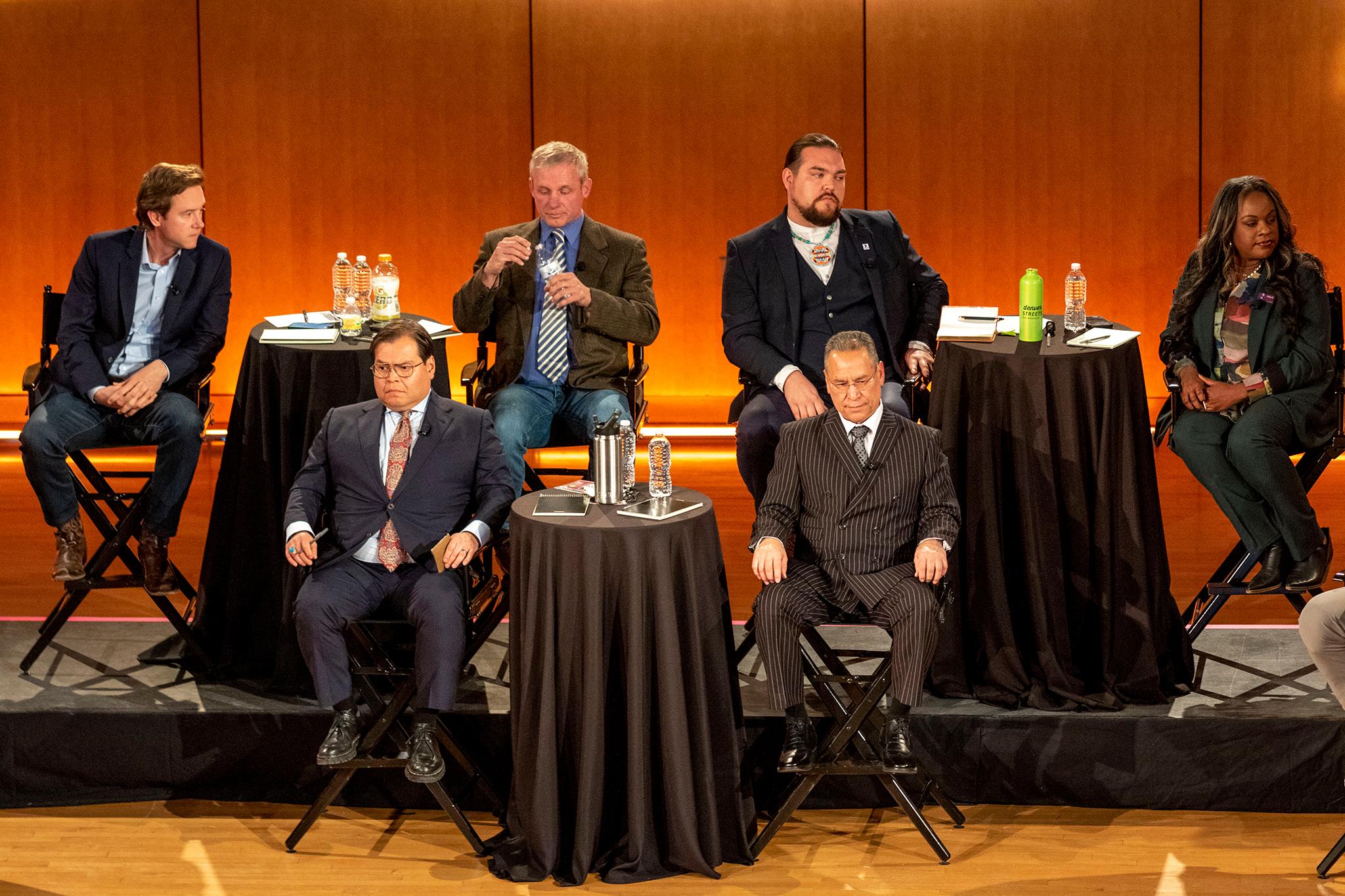
A spirited conversation about safe injection sites led to some powerful answers from all sides of the issue -- and an odd one.
Calderón argued such sites should be framed as "overdose prevention sites" and said evidence shows they save lives.
"Continuing to punish people, criminalize people, does not work," she said.
Herod talked about touring supervised injection sites that work and some that don't work in Vancouver, with Denver's Harm Reduction Action Center. She will be a yes vote on a bill at the Statehouse that would allow municipalities to legalize supervised injection sites -- which Denver has voted to approve if the state changes its law banning them.
Hansen opposed them and said he preferred state-funded treatment centers.
When asked about supervised injection sites, Brough said she objects to them for personal reasons.
"I spent my entire life loving someone who struggled with an addiction," she said, referring to her husband who died by suicide. "I know how hard it is to figure out how you love and support someone but not enable a behavior that's destroying them and your family. And I think for me I struggle with the enabling piece and am trying to draw that line."
She discussed spending time touring the Harm Reduction Action Center and trying to understand the benefit of harm reduction approaches. She was sad the transition rate from that form of social service to treatment was not larger.
Yet she was hardly dogmatic on the issue.
"I think it's a fair conversation for a community to have -- not to fight about it, but to recognize this is really hard," she said.
Ortega, in the meantime, made the incorrect claim that Denver already has a supervised injection site.
"You believe we already have one," Clark responded.
"We already have one," she said, making the claim that the Harm Reduction Action Center was a supervised injection site, which it is not.
Clark clarified she was talking about a syringe exchange program -- not a supervised injection site, which would be currently prohibited by state law.
"Fair enough," she said.
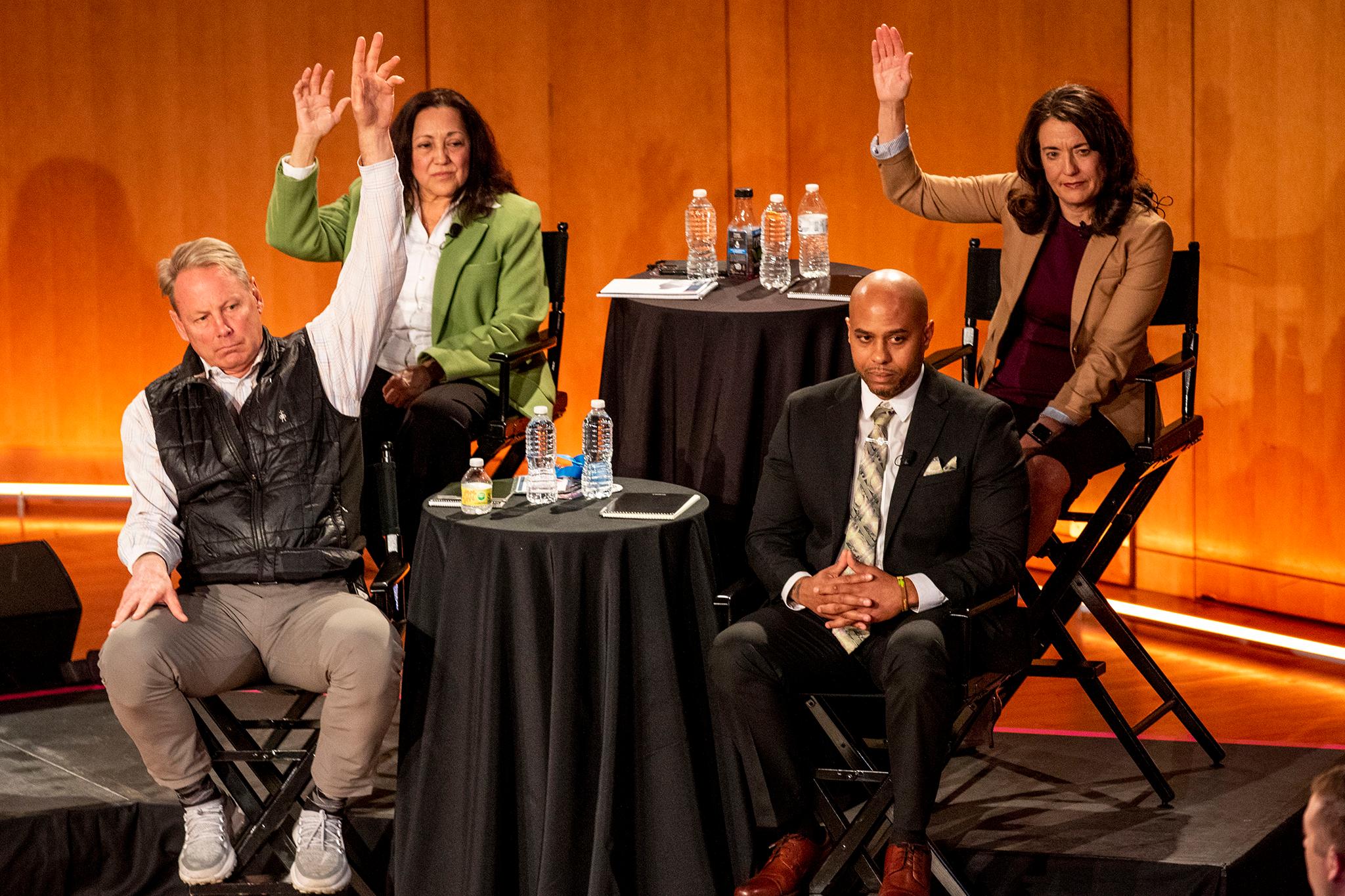
Brough faced scrutiny over her time at the helm of the Denver Metro Chamber of Commerce.
Her campaign, which has doubled-down on her story of pulling herself up by the bootstraps and facing significant adversity to become a leader at some of the major civic institutions, has not focused on specific policy proposals she championed.
One of those was objecting to a measure for Paid Family Leave. She didn't like how the policy was written and believed participants paying into the system should receive 100% pay -- instead of a fraction of that.
But Spearman -- who took flack at the last debate for failing to pay his Tattered Cover employees enough to keep them sheltered -- described her stance as "unconscionable."
"One of the hardest things workers have to deal with is that when they're not working they're not getting paid," he said. "And the simple fact is that if you support our employees and quite frankly if you support women who have to take time off from jobs to raise their kids, to give birth, then you support Paid Family Leave."
She responded that she provided paid family leave to her employees.
"Kelly, that's the definition of privilege that you would give something to your employees that you wouldn't compel other people to get throughout the state," Spearman said. "It's a huge issue when we're thinking about equality and how we get equitable outcomes."
Before and after the debate, several candidates were miffed that they weren't included.
Unlike CBS and Regis University, which hosted the first Fair Elections Fund debate, 9News decided to omit candidates who had not participated in or qualified for the taxpayer match. That meant that Andy Rougeot, Gardner, Robert Treta and Renate Behrens were not on the stage.
Rougeot, the lone registered Republican in this non-partisan race, waged a loud campaign about being excluded.
But excluding candidates wasn't against the rules. The new Fair Elections Fund rules mandated participation in the debate for candidates who planned to receive money from the taxpayer-funded 9-1 match for eligible donations. But there is no legal requirement that candidates who made the ballot but aren't participating in the Fair Elections Fund must be invited.
"I believe taxpayer dollars should be used to enforce Denver's camping ban and to hire 400 more police officers - not to pay for the political campaigns of corrupt politicians," Rougeot wrote in a statement ahead of the debate. "9News and my opponents in this race may believe that taxpayer dollars are better spent on political consultants than on cleaning up our streets, but that doesn't mean they should be able to silence the voices of those who disagree with their corrupt beliefs."
After the event, Treta stood out in the 15-degree weather, heckling candidates like Hansen, who was hustling out of the event with his two kids.
Treta talked up his skills as a builder and doer, but mostly nobody was listening.
"I'm not here to make friends," he said. "I'm here because I love my city. I'm here to make a real difference."
Correction: This story has been updated with a correct explanation from Terese Howard of the data Spearman misread. Howard's explanation of the numbers differed from what we initially reported.

